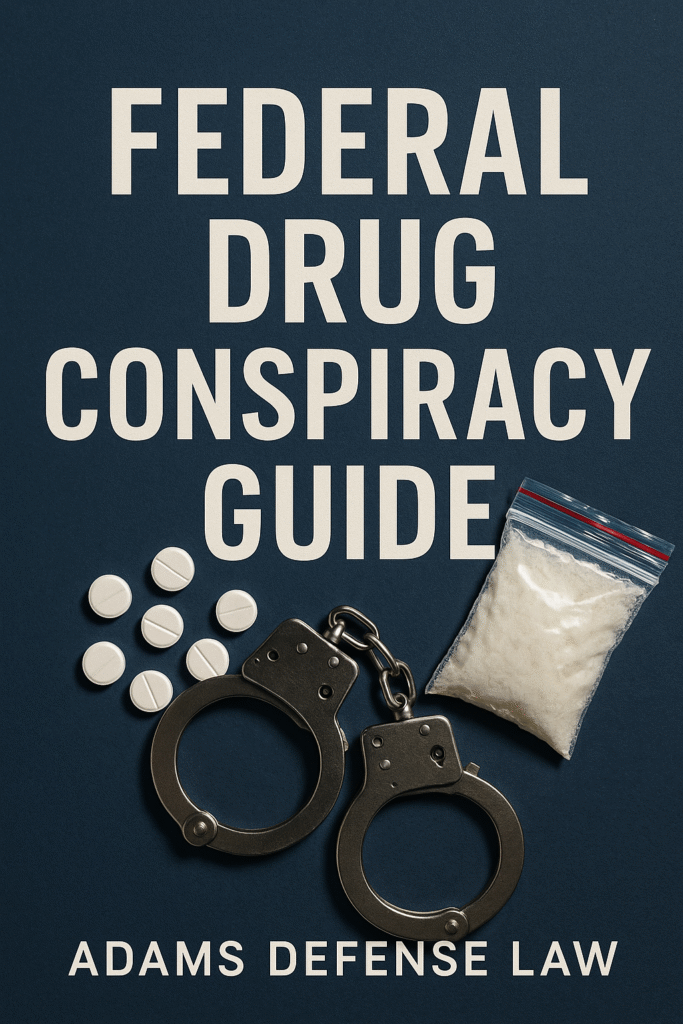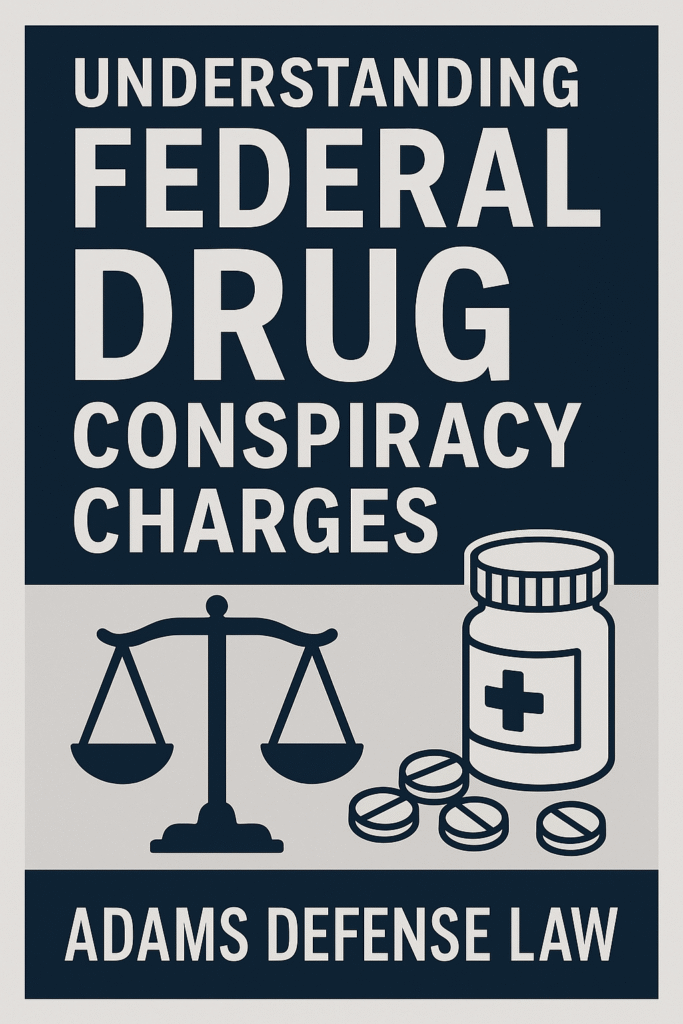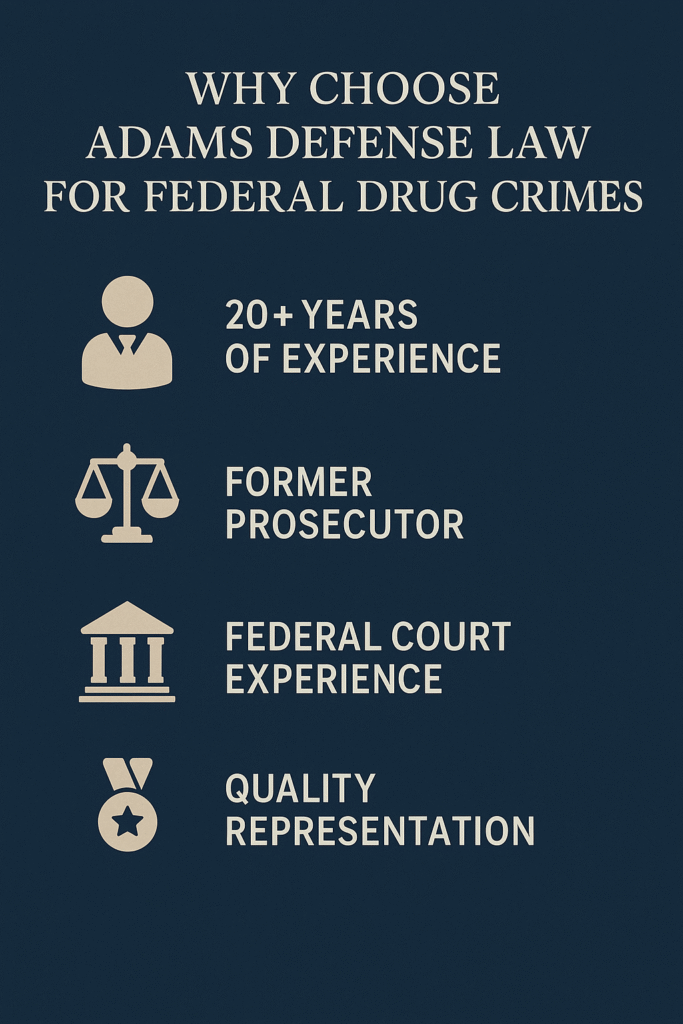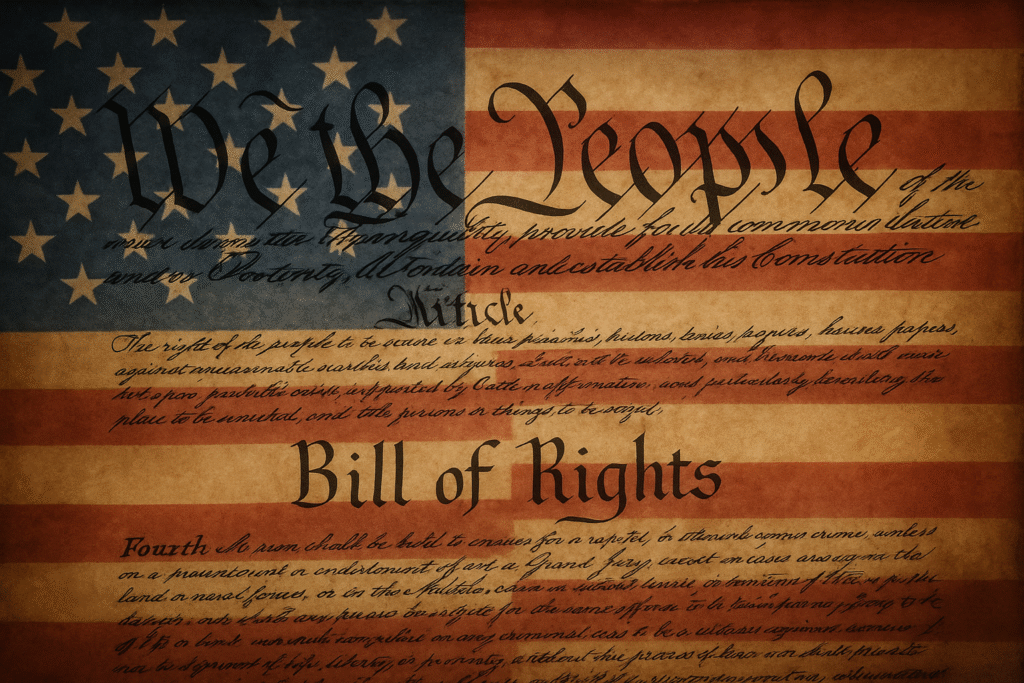Federal Drug Conspiracy Guide
Federal Drug Conspiracy Lawyer | Chicago, NYC, Kansas City
Experienced federal defense attorney providing aggressive representation for drug conspiracy charges, including RICO predicates and complex multi-defendant cases.
Federal drug conspiracy charges represent one of the most prosecuted and harshly penalized offenses in the federal criminal justice system. Unlike other drug crimes that require proof of actual drug possession or distribution, conspiracy charges can be based solely on an agreement to commit drug offenses, making them a powerful prosecutorial tool that can ensnare individuals with minimal involvement in actual drug activities.
At Adams Defense Law, attorney Josh Adams has extensive experience defending clients against federal drug conspiracy charges in Chicago, New York City, and Kansas City. Our strategic approach focuses on challenging the government’s evidence, protecting constitutional rights, and achieving the best possible outcomes for clients facing these complex federal prosecutions.
Call (312) 566-9173 for immediate consultation or complete our confidential case evaluation to discuss your federal conspiracy charges.


Understanding Federal Drug Conspiracy Charges
Federal drug conspiracy is prosecuted under 21 U.S.C. § 846, which makes it illegal to conspire to commit any drug offense that would be punishable under federal controlled substance laws. The government’s burden of proof for conspiracy is often lower than for the underlying drug crimes, making these charges particularly dangerous for defendants.
Essential Elements of Drug Conspiracy
To prove federal drug conspiracy, prosecutors must establish:
Agreement: Two or more people agreed to violate federal drug laws. The agreement doesn’t need to be formal or explicit – it can be inferred from circumstantial evidence and the conduct of the alleged conspirators.
Knowledge: Each defendant must have known about the illegal purpose of the conspiracy. However, defendants don’t need to know all details of the operation or all other participants.
Voluntary Participation: Each defendant must have voluntarily joined the conspiracy. Mere association with conspirators or presence during drug activities isn’t sufficient.
Overt Act: At least one conspirator must commit an overt act in furtherance of the conspiracy. This act doesn’t need to be illegal by itself and can be seemingly innocent conduct.
Why Conspiracy Charges Are So Dangerous
Federal drug conspiracy prosecutions present unique challenges for defendants:
Vicarious Liability: Conspirators can be held responsible for all reasonably foreseeable acts of their co-conspirators, even if they didn’t directly participate in or know about specific acts.
Hearsay Evidence: Statements made by co-conspirators in furtherance of the conspiracy are admissible against all members, creating significant evidentiary challenges.
Joint Trials: Multiple defendants are often tried together, creating complicated dynamics where co-defendants’ interests may conflict.
Sentence Enhancements: Conspiracy convictions often carry the same penalties as the underlying substantive offenses, including mandatory minimum sentences.
Types of Federal Drug Conspiracy Cases

Traditional Drug Conspiracy
Traditional conspiracy cases involve groups of individuals working together to distribute controlled substances. These cases often develop through long-term investigations involving surveillance, wiretaps, and confidential informants.
Common Scenarios:
- Distribution networks with suppliers, street-level dealers, and money handlers
- Family-based operations involving multiple relatives
- Workplace conspiracies involving legitimate businesses as fronts
- Neighborhood-based distribution organizations
Defense Challenges:
- Distinguishing between mere association and criminal agreement
- Challenging the scope and duration of alleged conspiracies
- Questioning individual defendants’ knowledge and intent
- Separating defendants’ roles and levels of involvement
RICO Drug Conspiracies
The Racketeer Influenced and Corrupt Organizations Act (RICO) allows prosecutors to charge drug conspiracies as part of larger criminal enterprises. RICO cases carry enhanced penalties and broader forfeiture provisions.
RICO Elements:
- Existence of an enterprise affecting interstate commerce
- Pattern of racketeering activity (including drug offenses)
- Defendant’s employment by or association with the enterprise
- Conducting enterprise affairs through racketeering activities
Defense Strategies:
- Challenging the existence or continuity of the alleged enterprise
- Questioning the pattern of racketeering activity
- Arguing lack of connection between defendant and enterprise
- Disputing the interstate commerce nexus
International Drug Conspiracies
International conspiracy cases involve allegations of coordinating drug importation or distribution across national borders. These cases often involve multiple jurisdictions and complex evidence from foreign countries.
Typical Elements:
- Coordination with foreign suppliers or distributors
- Use of international shipping or transportation networks
- Money laundering through international banking systems
- Communication with foreign co-conspirators
Defense Approaches:
- Challenging jurisdiction and venue issues
- Questioning the reliability of foreign evidence
- Examining treaty and international law compliance
- Investigating potential diplomatic immunity issues
Continuing Criminal Enterprise (CCE)
CCE charges, often called “drug kingpin” charges, target leaders of substantial drug operations. These charges carry some of the harshest penalties in federal criminal law.
CCE Requirements:
- Violation of federal drug laws as part of continuing series
- Acting in concert with five or more persons
- Occupying supervisory position or management role
- Obtaining substantial income or resources from the violations
Defense Focus:
- Challenging leadership role allegations
- Questioning the continuity and scope of alleged enterprise
- Disputing management or supervisory capacity
- Examining financial evidence and asset calculations
Federal Conspiracy Penalties and Sentencing
Federal drug conspiracy penalties often match those of the underlying substantive offenses, meaning conspiracy defendants face the same harsh mandatory minimum sentences as those who actually possess or distribute drugs.
Mandatory Minimum Sentences for Conspiracy
Conspiracy penalties are tied to the drug quantities involved in the overall conspiracy:
Cocaine Conspiracy:
- 5 kg conspiracy: 10-year mandatory minimum
- 500g conspiracy: 5-year mandatory minimum
Heroin Conspiracy:
- 1 kg conspiracy: 10-year mandatory minimum
- 100g conspiracy: 5-year mandatory minimum
Methamphetamine Conspiracy:
- 50g pure or 500g mixture conspiracy: 5-year mandatory minimum
- 500g pure or 5kg mixture conspiracy: 10-year mandatory minimum
Fentanyl Conspiracy:
- 40g conspiracy: 5-year mandatory minimum
- 400g conspiracy: 10-year mandatory minimum
Relevant Conduct and Sentencing
Under federal sentencing guidelines, conspiracy defendants can be sentenced based on all “relevant conduct” reasonably foreseeable to them, not just their personal involvement. This can dramatically increase sentences.
Relevant Conduct Includes:
- All acts and omissions by co-conspirators in furtherance of the conspiracy
- Reasonably foreseeable acts by co-conspirators
- Acts occurring before defendant joined the conspiracy
- Acts continuing after defendant’s involvement ended
Defense Strategies for Drug Conspiracy Cases
Defending federal drug conspiracy charges requires comprehensive strategies that address both legal and factual challenges unique to these complex prosecutions.
Challenging the Conspiracy Agreement
No Agreement Defense: The most fundamental defense challenges whether an agreement to violate drug laws actually existed. This strategy focuses on:
- Examining evidence of actual communications between alleged conspirators
- Challenging inferences drawn from circumstantial evidence
- Demonstrating independent parallel conduct rather than coordinated activity
- Questioning the timing and development of alleged agreements
Withdrawal Defense: Defendants who voluntarily withdrew from conspiracies before certain acts occurred may avoid liability for those acts:
- Proving affirmative acts inconsistent with conspiracy goals
- Demonstrating communication of withdrawal to co-conspirators
- Establishing reasonable efforts to prevent conspiracy objectives
- Timing withdrawal before commission of substantive offenses
Constitutional Challenges in Conspiracy Cases
Fourth Amendment Issues: Conspiracy investigations often involve extensive surveillance that may violate constitutional protections:
- Challenging wiretap authorizations and minimization procedures
- Questioning GPS tracking and cell phone location monitoring
- Examining search warrant applications and supporting affidavits
- Investigating surveillance of privileged attorney-client communications
Fifth Amendment Protections: Complex conspiracy cases present numerous opportunities for constitutional violations:
- Suppressing statements obtained during custodial interrogations
- Challenging grand jury proceedings and immunity grants
- Protecting against compelled self-incrimination
- Examining plea negotiations and cooperation agreements
Sixth Amendment Rights: Multi-defendant conspiracy cases often create conflicts affecting representation rights:
- Addressing potential conflicts of interest between co-defendants
- Ensuring effective assistance of counsel in joint trials
- Protecting attorney-client privilege in multi-defendant cases
- Examining adequacy of counsel during plea negotiations
Challenging Evidence and Witnesses
Co-Conspirator Statements: Federal rules allow co-conspirator statements made in furtherance of conspiracy to be admitted against all members. Challenging these statements requires:
- Proving statements were made after conspiracy ended
- Demonstrating statements were not in furtherance of conspiracy goals
- Challenging the preliminary showing of conspiracy existence
- Questioning the reliability and context of recorded conversations
Cooperating Witness Testimony: Many conspiracy cases rely heavily on testimony from co-defendants who have agreed to cooperate:
- Investigating cooperating witnesses’ motivations and benefits received
- Examining consistency between witness testimony and other evidence
- Challenging witness credibility through cross-examination
- Demonstrating bias, self-interest, and incentives to fabricate testimony
Surveillance Evidence: Conspiracy cases often involve months or years of surveillance evidence:
- Challenging the interpretation of surveillance activities
- Providing innocent explanations for defendant conduct
- Questioning the chain of custody for recordings and photographs
- Examining technical reliability of surveillance equipment
Multi-Defendant Case Considerations
Federal drug conspiracy cases often involve multiple defendants whose interests may conflict, creating complex strategic considerations.
Severance and Joinder Issues
Grounds for Severance:
- Conflicting defenses between co-defendants
- Prejudicial evidence admissible against some but not all defendants
- Disparity in evidence strength between defendants
- Risk of guilt by association
Strategic Considerations:
- Evaluating benefits and risks of joint versus separate trials
- Assessing co-defendant testimony and potential finger-pointing
- Managing jury confusion in complex multi-defendant cases
- Coordinating with co-defendant counsel when interests align
Plea Negotiation Dynamics
Cooperation Agreements: The government often offers cooperation agreements to some defendants in exchange for testimony against others:
- Understanding cooperation timing and strategic advantages
- Evaluating risks and benefits of cooperation versus trial
- Protecting clients from retaliation by co-defendants
- Managing proffer sessions and cooperation negotiations
Individual vs. Joint Negotiations:
- Assessing whether individual or coordinated plea strategies serve client interests
- Understanding how co-defendant plea agreements affect remaining defendants
- Timing plea negotiations to maximize leverage
- Protecting against adverse consequences of co-defendant cooperation
Working with Adams Defense Law
Immediate Response to Conspiracy Charges
When you contact Adams Defense Law about federal conspiracy charges, we take immediate action to protect your interests:
Case Assessment: We conduct comprehensive analysis of the charges, co-defendants, and potential evidence to develop initial defense strategies.
Investigation Coordination: Our team begins independent investigation while coordinating with co-defendant counsel when beneficial to all parties.
Evidence Preservation: We take steps to preserve exculpatory evidence and prevent destruction of materials favorable to the defense.
Comprehensive Defense Development
Expert Analysis: We work with former federal prosecutors, DEA agents, and other experts who understand conspiracy investigations and can identify weaknesses in the government’s case.
Discovery Management: We thoroughly analyze all government evidence, including wiretap recordings, surveillance reports, and financial records, to identify inconsistencies and constitutional violations.
Motion Practice: We file comprehensive pretrial motions challenging evidence, seeking dismissals, and protecting your constitutional rights throughout the proceedings.
Trial Strategy and Representation
Individual Defense Focus: While managing the complexities of multi-defendant cases, we maintain unwavering focus on achieving the best outcome for our individual clients.
Jury Communication: We effectively communicate complex conspiracy law to jurors, helping them understand the high burden of proof required for conviction.
Cross-Examination: Our extensive trial experience allows us to effectively challenge government witnesses, particularly cooperating co-defendants and law enforcement officers.

Related Federal Drug Defense Services
Our conspiracy defense practice integrates with our comprehensive federal drug crime representation:
Federal Drug Crimes Overview → – Understanding how conspiracy charges fit within broader federal drug enforcement priorities and strategies.
Federal Drug Trafficking Defense → – Many conspiracy cases include substantive trafficking charges requiring coordinated defense strategies.
Federal Drug Distribution Defense → – Understanding the relationship between conspiracy allegations and underlying distribution charges.
Federal Drug Manufacturing Defense → – Conspiracy cases often involve manufacturing allegations requiring specialized technical defenses.
State and Local Drug Defense Connection
Our federal conspiracy defense builds on extensive experience with related state charges:
Chicago Drug Defense → – Understanding how state investigations can escalate to federal conspiracy prosecutions.
Federal Agencies in Conspiracy Investigations
Drug Enforcement Administration (DEA)
DEA conspiracy investigations typically involve:
- Long-term surveillance operations targeting distribution networks
- Controlled purchases and undercover operations within conspiracy groups
- Wire communications interception and analysis
- Coordination with local law enforcement task forces
Federal Bureau of Investigation (FBI)
FBI involvement often indicates connections to organized crime or public corruption:
- RICO investigations targeting criminal enterprises
- Public corruption cases involving drug conspiracies
- Violent crime task forces addressing drug-related violence
- International conspiracy investigations
Bureau of Alcohol, Tobacco, Firearms and Explosives (ATF)
ATF participation typically involves:
- Firearms trafficking connected to drug conspiracies
- Violent crime investigations involving drug organizations
- Interstate firearms violations within conspiracy cases
- Explosive manufacturing or trafficking allegations
Time-Critical Defense Considerations
Federal conspiracy charges require immediate professional attention:
Detention Hearings: Conspiracy defendants often face pretrial detention based on allegations of ongoing criminal activity and flight risk.
Cooperation Timing: Early cooperation opportunities may provide significant sentencing benefits, but require careful evaluation of risks and benefits.
Evidence Preservation: Critical evidence may be lost or destroyed without immediate action to preserve it through proper legal channels.
Co-Defendant Coordination: Early communication with co-defendant counsel can prevent conflicts and identify opportunities for coordinated defense strategies.
Protect Your Future: Contact Adams Defense Law Now
Federal drug conspiracy charges can result in decades in prison and permanently destroy your future. These complex cases require immediate attention from experienced federal criminal defense counsel.
Get immediate help:
- Call (312) 566-9173 for urgent consultation
- Complete our secure case evaluation for comprehensive case review
Attorney Josh Adams provides aggressive federal conspiracy defense in Chicago, New York City, Kansas City, and federal courts nationwide. We understand the complexities of multi-defendant cases and are available 24/7 for criminal defense emergencies.
Don’t wait – contact us immediately to protect your rights and begin building your defense against federal conspiracy charges.
This information is provided for educational purposes and does not constitute legal advice. Federal drug conspiracy cases involve complex legal issues requiring individualized analysis by experienced counsel. Case outcomes depend on specific facts and circumstances.
Why Choose Adams Defense Law for Federal Drug Crimes
Proven Federal Court Experience
Attorney Josh Adams has extensive experience defending clients in federal court across multiple jurisdictions. This experience is crucial when facing the complex procedural and substantive challenges of federal drug prosecutions.
Multi-Jurisdictional Practice
With active practice in Chicago, New York City, and Kansas City federal courts, Adams Defense Law can provide consistent representation regardless of where your case is being prosecuted.
Comprehensive Case Investigation
We conduct thorough investigations of every case, including:
- Independent forensic analysis
- Expert witness consultation
- Investigation of law enforcement procedures
- Discovery of exculpatory evidence
Client-Centered Approach
We understand that federal drug charges can devastate individuals and families. Our approach focuses on:
- Clear communication throughout the process
- Realistic assessment of case strengths and weaknesses
- Exploration of all available defense options
- Preparation for trial when necessary

Contact Federal Drug Lawyers
Contact Our Federal Criminal Defense Attorney
If you’re facing federal charges or under federal investigation in Chicago, New York City, or Kansas City, time is critical. Federal cases move quickly once charges are filed, and early intervention can significantly impact your case outcome.
Call (312) 566-9173 for immediate consultation
Available 24/7 for:
- Federal arrests and detention hearings
- Grand jury subpoenas and target letters
- Federal search warrants
- Emergency federal court matters
Office Locations:
Chicago Office (Primary) Adams Defense Law
(312) 566-9173 info@adamsdefenselaw.com
Free Consultation: All federal criminal defense consultations are confidential and protected by attorney-client privilege.
Get Your Free Criminal Case Evaluation
Disclaimer: This website provides general information about federal criminal defense. It does not constitute legal advice and does not create an attorney-client relationship. Federal criminal cases are complex and fact-specific. Consult with an experienced federal criminal defense attorney for advice about your specific situation

